This recipe was originally developed in partnership with the National Pork Board. All opinions are my own.
You Don’t Need Tomatoes To Make a Rich and Velvety Bolognese Sauce!
It may come as a surprise to learn that there are 2 versions of Italian ragu alla bolognese: the hearty, tomato-forward bolognese we’re most familiar with here in the U.S. (like our PWWB reader favorite Best-Ever Bolognese recipe) and bolognese bianco. The difference comes down to the tomatoes – bolognese bianco is a lusciously creamy and hearty meat sauce made without tomatoes.
As a bolognese enthusiast, I’ve always wanted make this lesser known version. We’ve shared plenty of red bolognese recipes here on PWWB over the years – everything from decadent lasagna bolognese to leaner ground turkey bolognese – but our collection felt incomplete without a proper white bolognese recipe.
Succulent ground pork gently simmers with pancetta, soffritto, fresh herbs, and white wine, creating a hearty sauce laced with aromatic flavor. After a quick simmer, a generous splash of heavy cream brings everything together with a velvety finishing touch.
The resulting white bolognese sauce is luscious, creamy, and rich, but it’s also a little bit lighter-tasting than the average ragu sauce given to the absence of tomatoes. Simply toss with pasta and enjoy – an instant comfort food favorite!
Key Ingredients
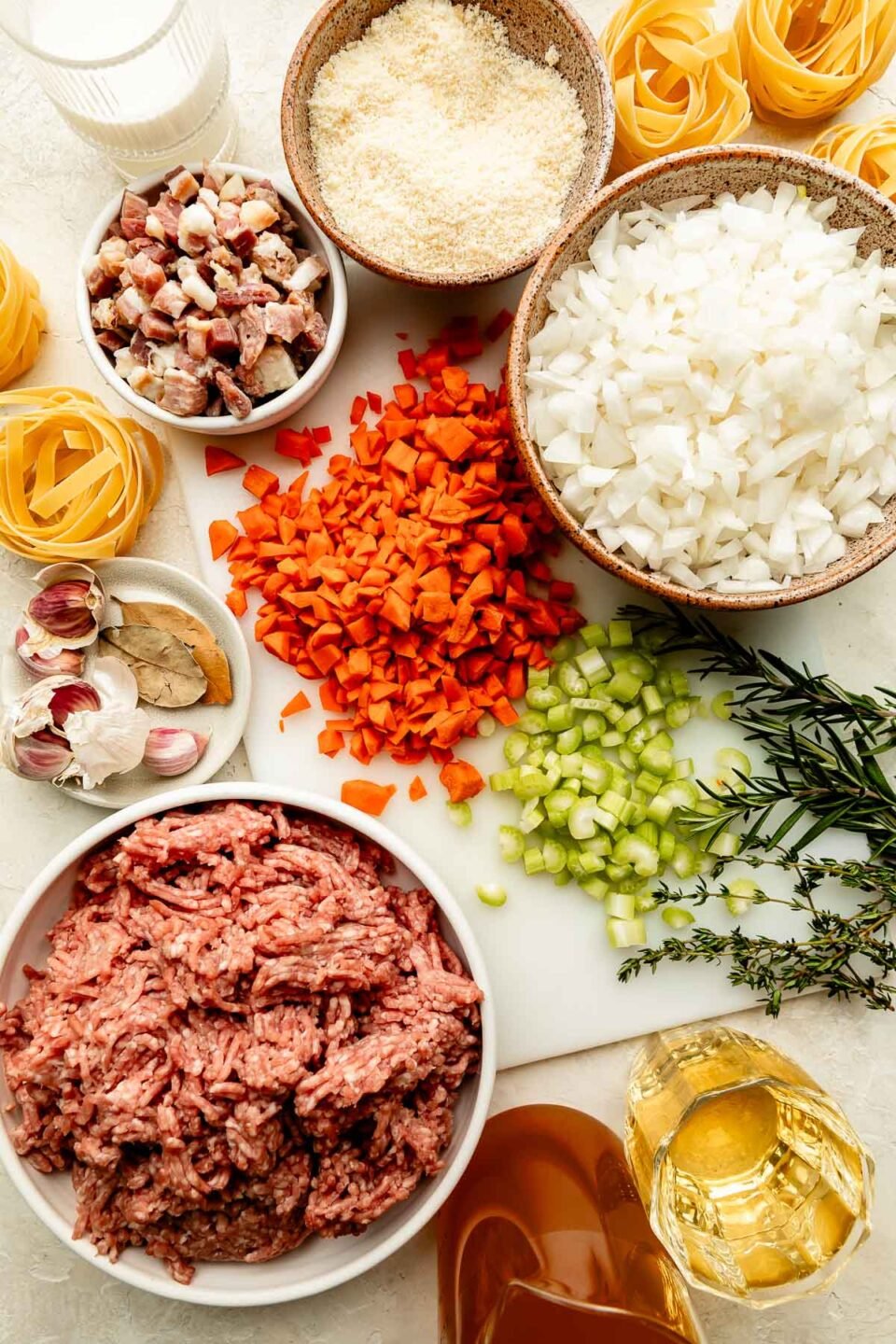
Note: Full ingredients list & measurements provided in the Recipe Card, below.
Best meat for white bolognese? ⇢ While bolognese sauce is traditionally prepared with ground beef and/or veal, after several rounds of recipe testing, I grew partial to using ground pork here. Its delicate and subtly sweet flavor is ideal for creating a lighter sauce with balanced flavor.
Other key ingredients:
- Pancetta is essentially cured, unsmoked Italian bacon. Its intense savoriness adds incredible depth of flavor to white bolognese sauce. You can find it in most conventional grocery stores these days – check the Recipe Notes, below, for more sourcing tips!
- White wine is ideal for a creamy sauce since its natural brightness helps balance out rich flavor and texture. I typically cook with Pinot Grigio but any dry, unoaked white wine works well here. Prefer not to cook with alcohol? ⇢ Feel free to substitute with chicken stock, noting that you may want to add a squeeze of lemon juice or splash of vinegar to replicate brightness of wine.
- Heavy cream – When preparing ragu sauce, I typically suggest heavy cream as an optional – albeit delicious! – finishing touch. Here, it’s a non-negotiable ingredient. In the absence of tomatoes, a generous splash of heavy cream gives the white bolognese sauce its luscious, velvety body. It’s not to be skipped!
Shop This Post
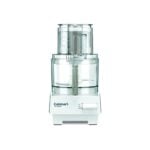 Buy Now →
Buy Now → 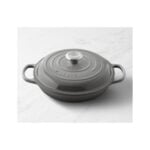 Buy Now →
Buy Now → 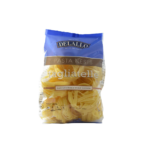 Buy Now →
Buy Now → 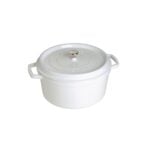 Buy Now →
Buy Now → 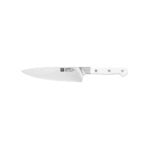 Buy Now →
Buy Now →  Buy Now →
Buy Now → 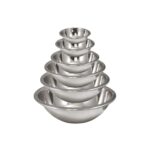 Buy Now →
Buy Now → 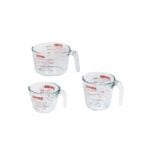 Buy Now →
Buy Now → 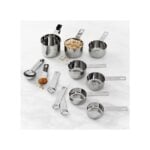
Stainless Steel Measuring Cups & Spoons
Buy Now →How to Make White Bolognese Sauce
Whether preparing red or white bolognese sauce, the process consists of the same 3 main steps: browning, deglazing, and simmering.
There’s a little prep and patience involved, but the result is well worth it! It’s a one-pot operation designed to build layers of richness every step of the way, ultimately creating a restaurant-worthy sauce with incredible depth of flavor.
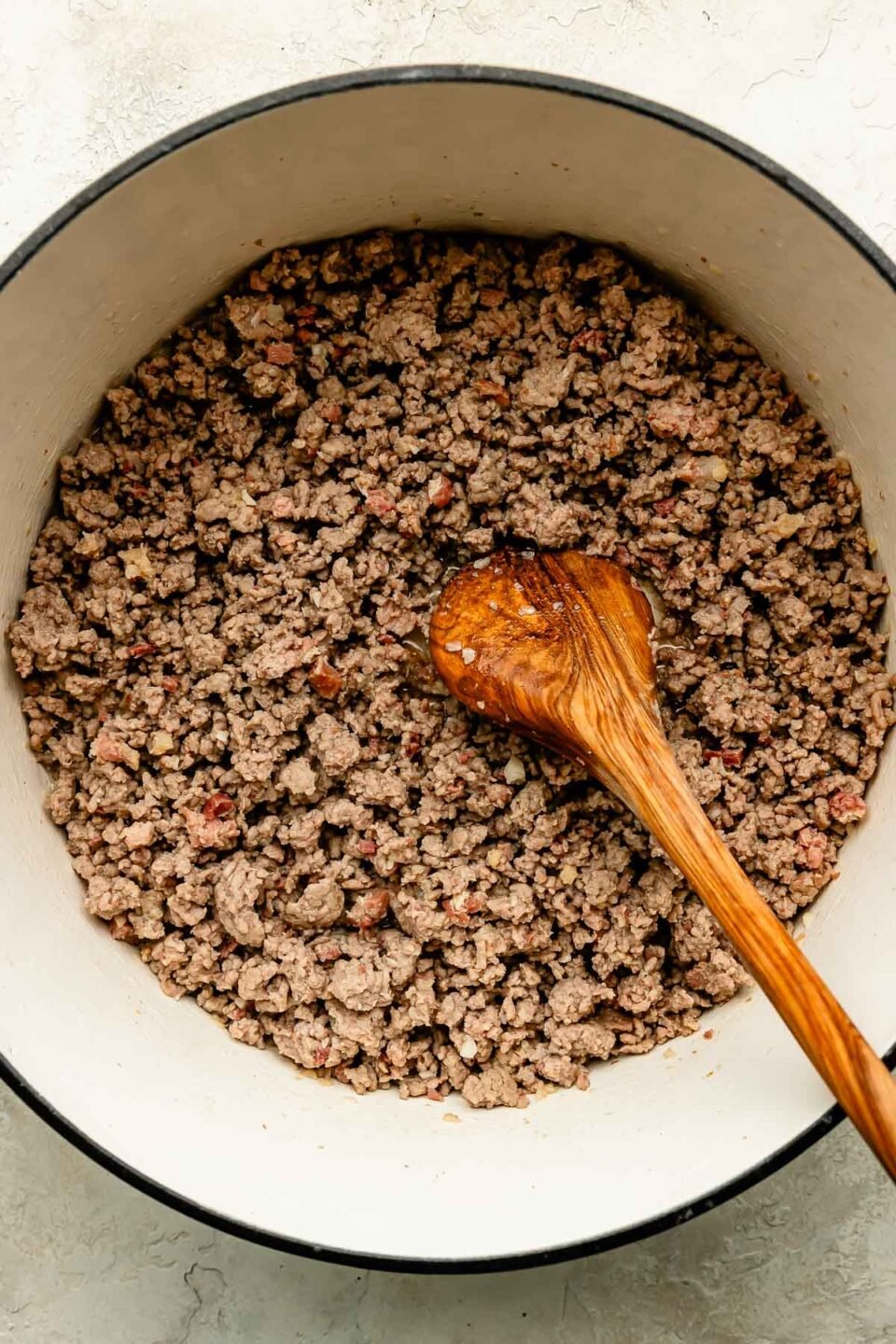
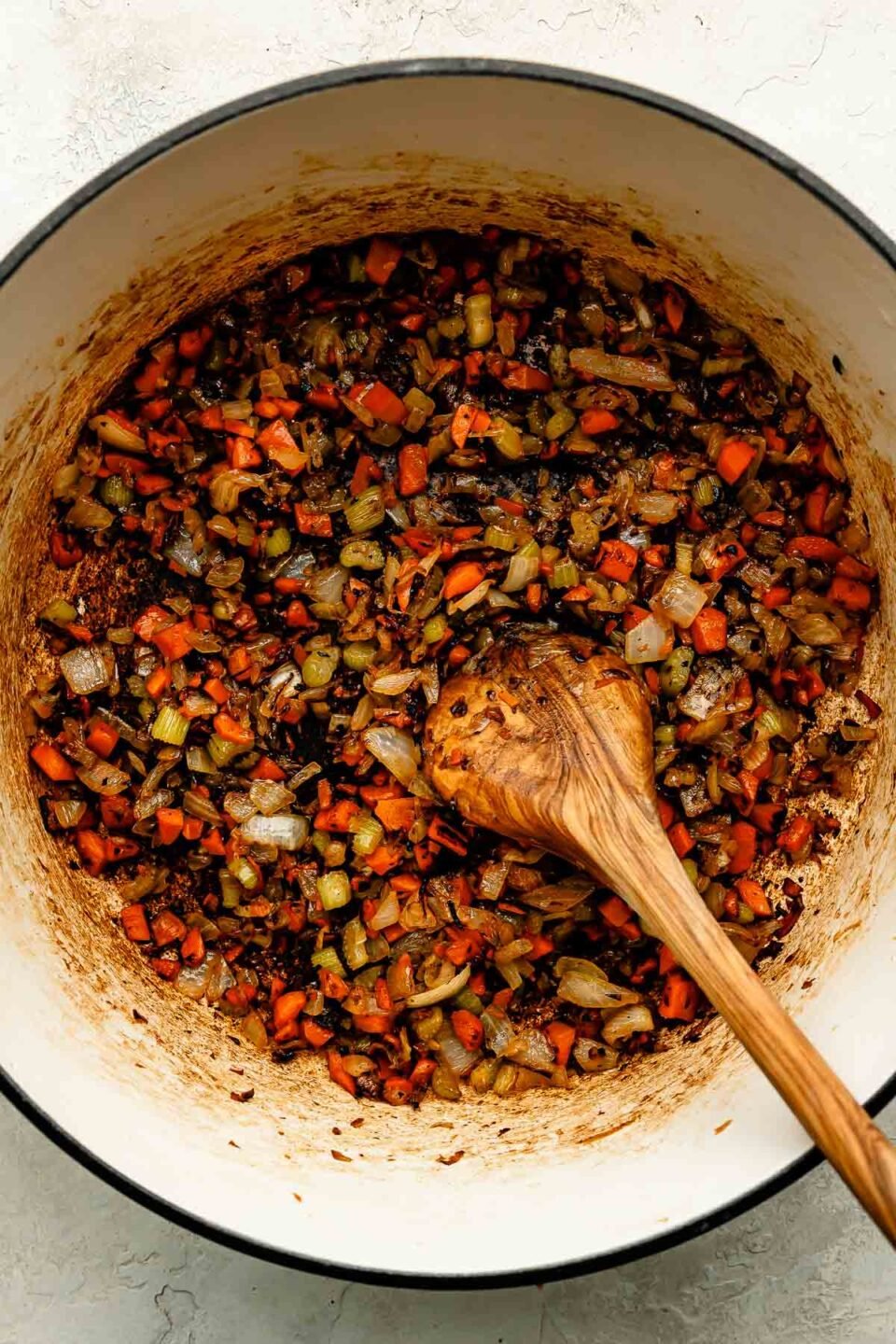
Full Recipe Directions, including step-by-step photos, are included in the Recipe Card, below.
Prepare a pestata. A flavor-boosting technique I first learned from iconic Italian chef Lidia Bastianch, the pestata used here is a blend of of finely chopped pancetta and garlic. To make it, simply pulse the 2 ingredients in a food processor until the garlic disappears into the pancetta fat. Why? ⇢ These fine bits of pancetta and garlic practically melt into the white bolognese sauce as it simmers, infusing it with decadent, rich flavor.
Brown the pestata and pork. Render the pestata by cooking it a large, heavy-bottomed pot. Once the mixture is golden and deliciously fragrant, add in the ground pork. Once the pork is nicely browned, remove all the meat from the pot. Tip! ⇢ Reserve some of the rendered pork fat in the pot – it’s perfect for browning soffritto.
Brown the soffritto. Cook the mixture of carrots, celery, and onion for 15-20 minutes, until the vegetables are deeply browned and nearly caramelized. Why so long? ⇢ This is where the flavor is! Don’t rush this process. Deeply browned veggies create a base of richness for the entire white bolognese sauce.
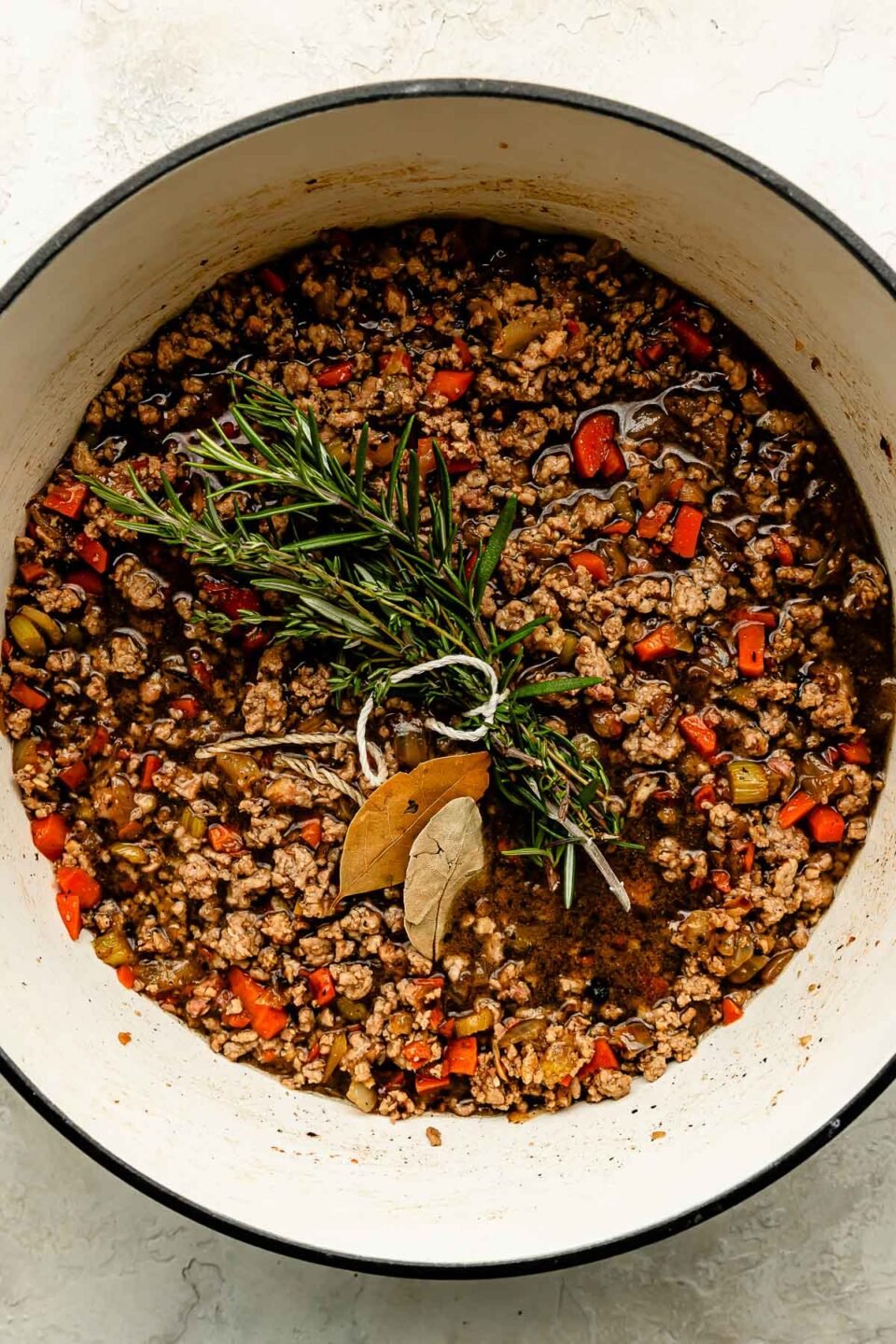
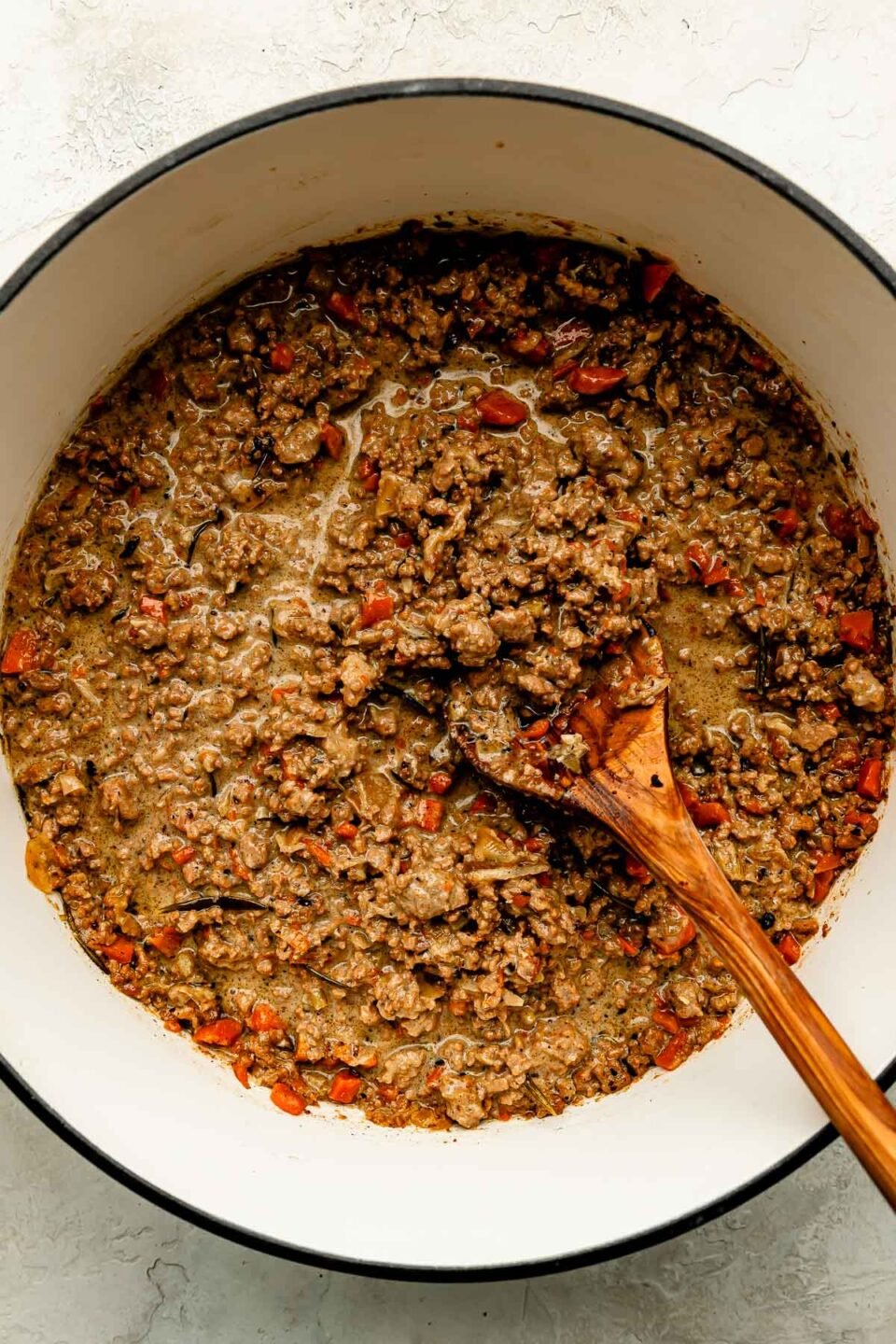
Full Recipe Directions, including step-by-step photos, are included in the Recipe Card, below.
Deglaze the pot. Stir the pork and pestata mixture into the browned soffritto, then slowly pour white wine into the pot. Why? ⇢ The liquid creates steam as it hits the hot pot, releasing the flavorful browned bits of fond developed up to this point. Use a wooden spoon to scrape up them up, stirring them into the white bolognese sauce.
Simmer. Build the white bolognese sauce by adding fresh herbs, bay leaves, parmesan rind, and chicken broth. Gently simmer, stirring occasionally, for about 45 minutes, or until the sauce is fragrant and reduced.
Finish with heavy cream. Once the sauce is simmered, remove and discard the spent herbs, bay leaves, and parmesan rind. Then stir in the heavy cream and parmesan cheese to finish, simmering for a few minutes longer to bring everything together.
Alternate Cooking Methods
I love prepping white bolognese sauce with a low stovetop simmer, but you can also prepare this recipe in a slow cooker or Crockpot, or an electric pressure cooker like the Instant Pot. Check the Recipe Notes, below, for step-by-step guidance!
Tossing White Bolognese Sauce with Pasta and Serving Suggestions
Like any rich meat sauce, white bolognese pairs best with cozy carbs like pasta, gnocchi, or even creamy mashed potatoes.
Best pasta to pair with white bolognese sauce? ⇢ Heartier sauces like bolognese pair best with wide, flat pasta, like pappardelle or fettuccine. Personally, I like serving this white bolognese sauce with tagliatelle (pictured), a long pasta that’s something of a middle ground between pappardelle and fettuccine – you get the best of both worlds! If you prefer short pasta, go for a ridged, tube-shaped shape like rigatoni.
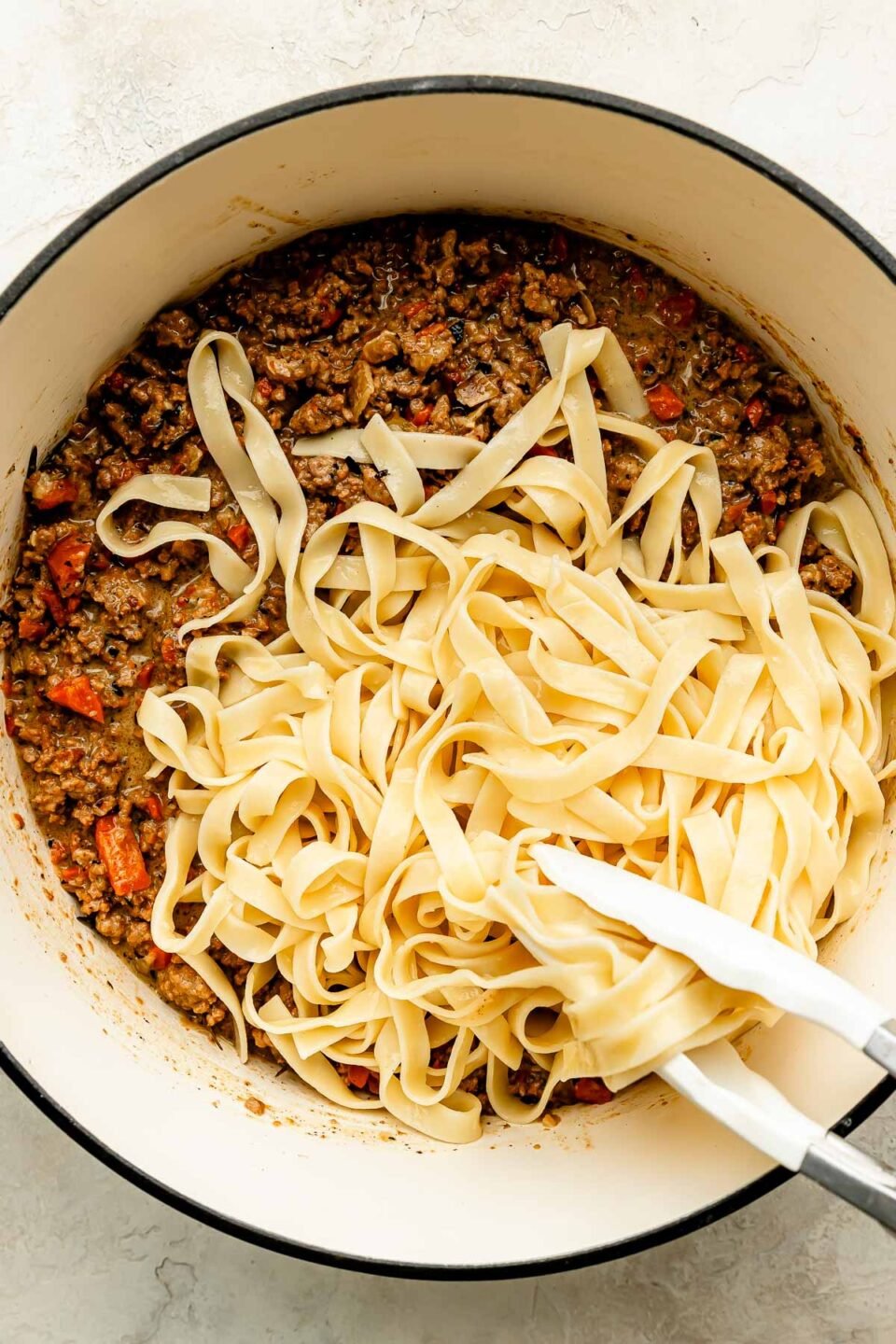
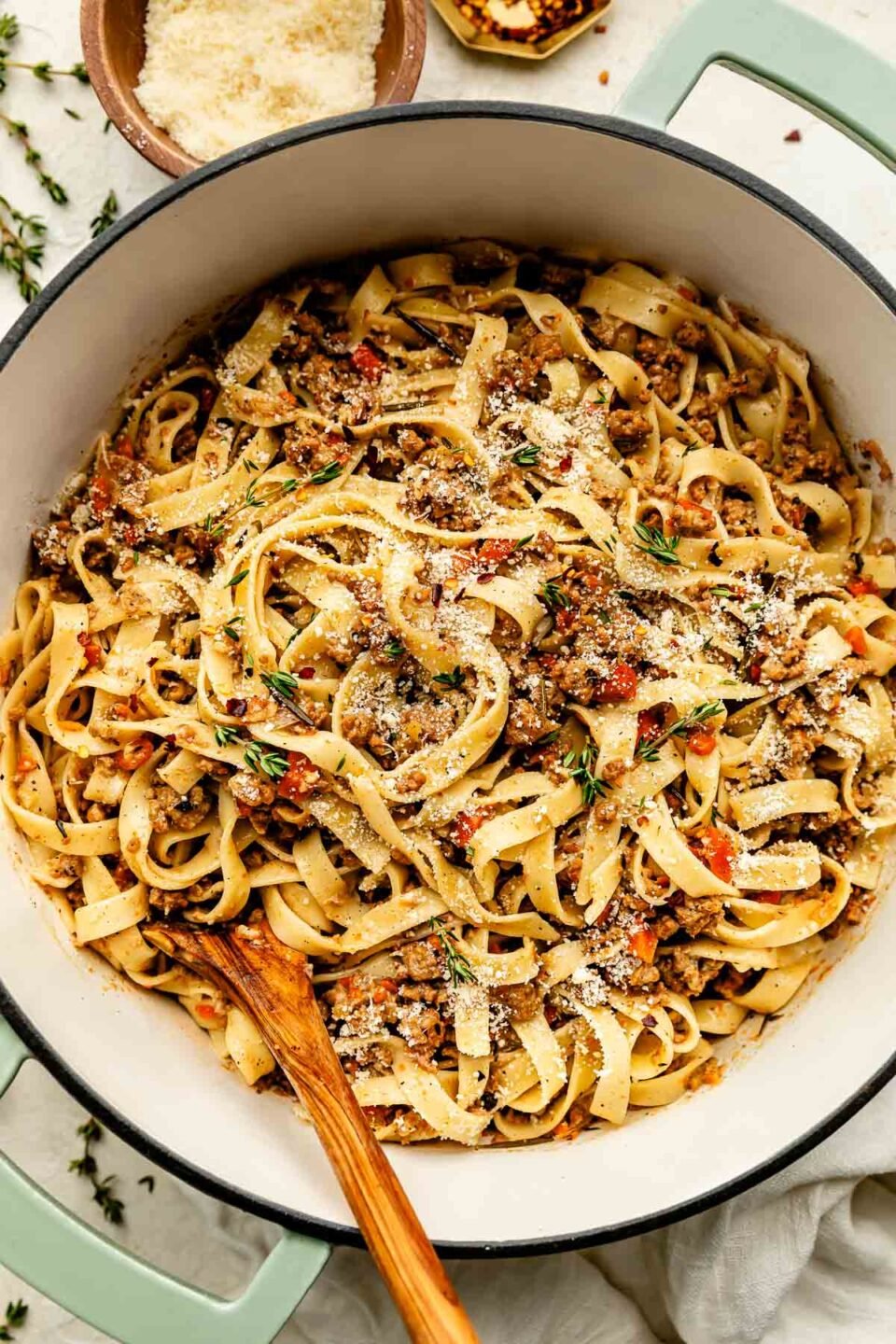
Full Recipe Directions, including step-by-step photos, are included in the Recipe Card, below.
The #1 mistake I see home cooks make when preparing a pasta dish is simply plopping a spoonful of white bolognese sauce on a plate of cooked pasta. Please don’t do this! For restaurant-worthy results, always simmer your al dente pasta with the sauce before serving. To learn more, check out my complete guide for How to Cook Pasta Perfectly Every Single Time.
Boil the pasta. When your white bolognese sauce is assembled and simmering, bring a large pot of water to a boil. Generously season it with salt and drop in the tagliatelle or your pasta of choice. Cook to al dente according to the packaging instructions. Tip! ⇢ Before draining the pasta, be sure to reserve some of the starchy pasta water – it’s liquid gold!
Add the cooked tagliatelle to the white bolognese sauce, tossing to evenly coat the pasta in sauce. Allow everything to cook together for a few minutes – this is the key to building a cohesive pasta dish!
Adjust as needed. If the white pasta bolognese is too thick, thin it out with a splash of your reserved starchy pasta water. If it’s too loose, crank up the heat for a more vigorous simmer or toss in a little more parmesan cheese. Continue adjusting until it looks and feels just right.
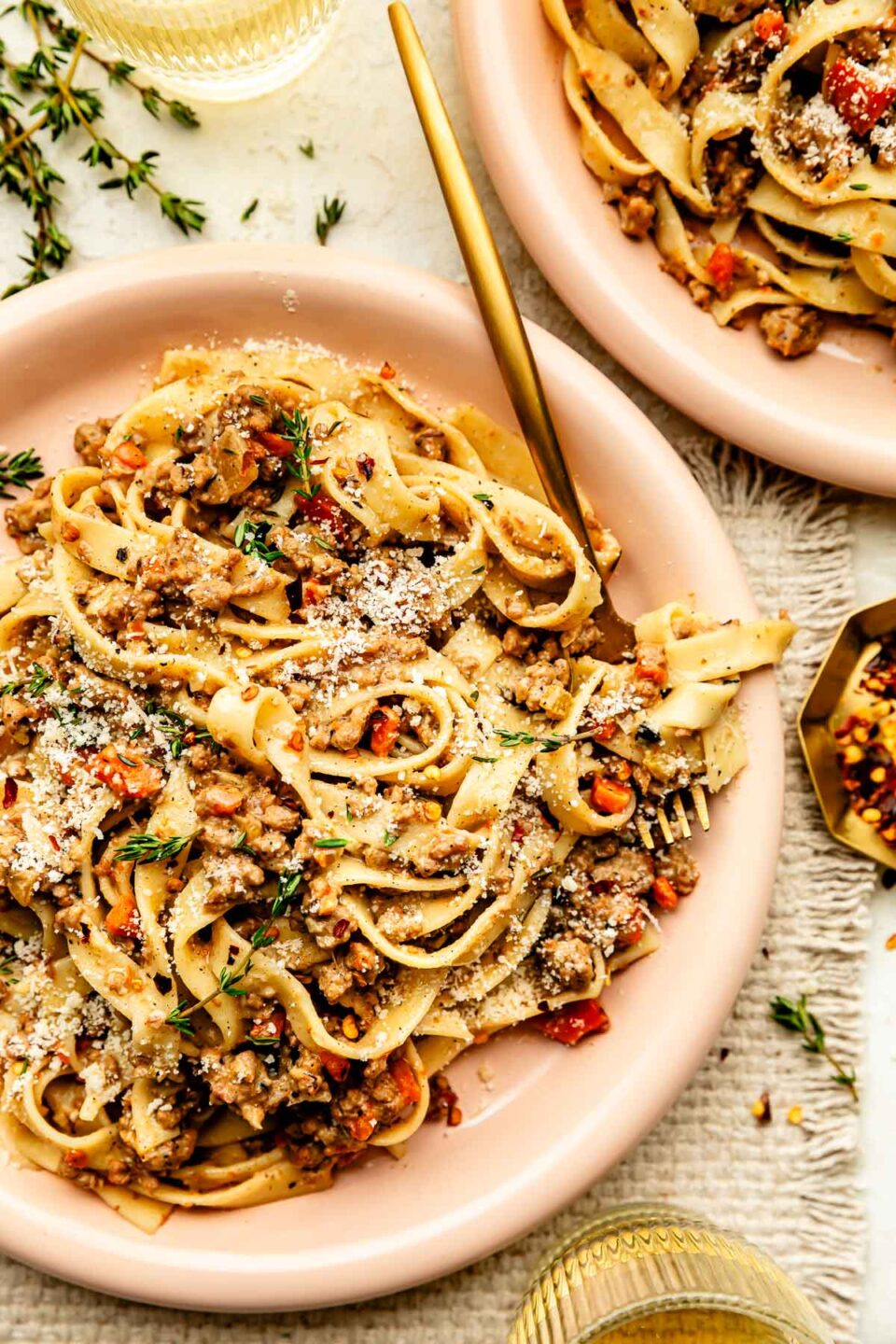
From there, serve alongside a hearty Kale Caesar Salad, pour yourself a glass of wine, dig in, and enjoy!
Make-Ahead, Storage and Freezing
White bolognese sauce stores very well – its flavors get even better the longer it sits! Feel free to prep the sauce ahead of time. It will keep in the refrigerator for up to 5 days or in the freezer for up to 3 months. Check the Recipe Notes, below, for step-by-step guidance!
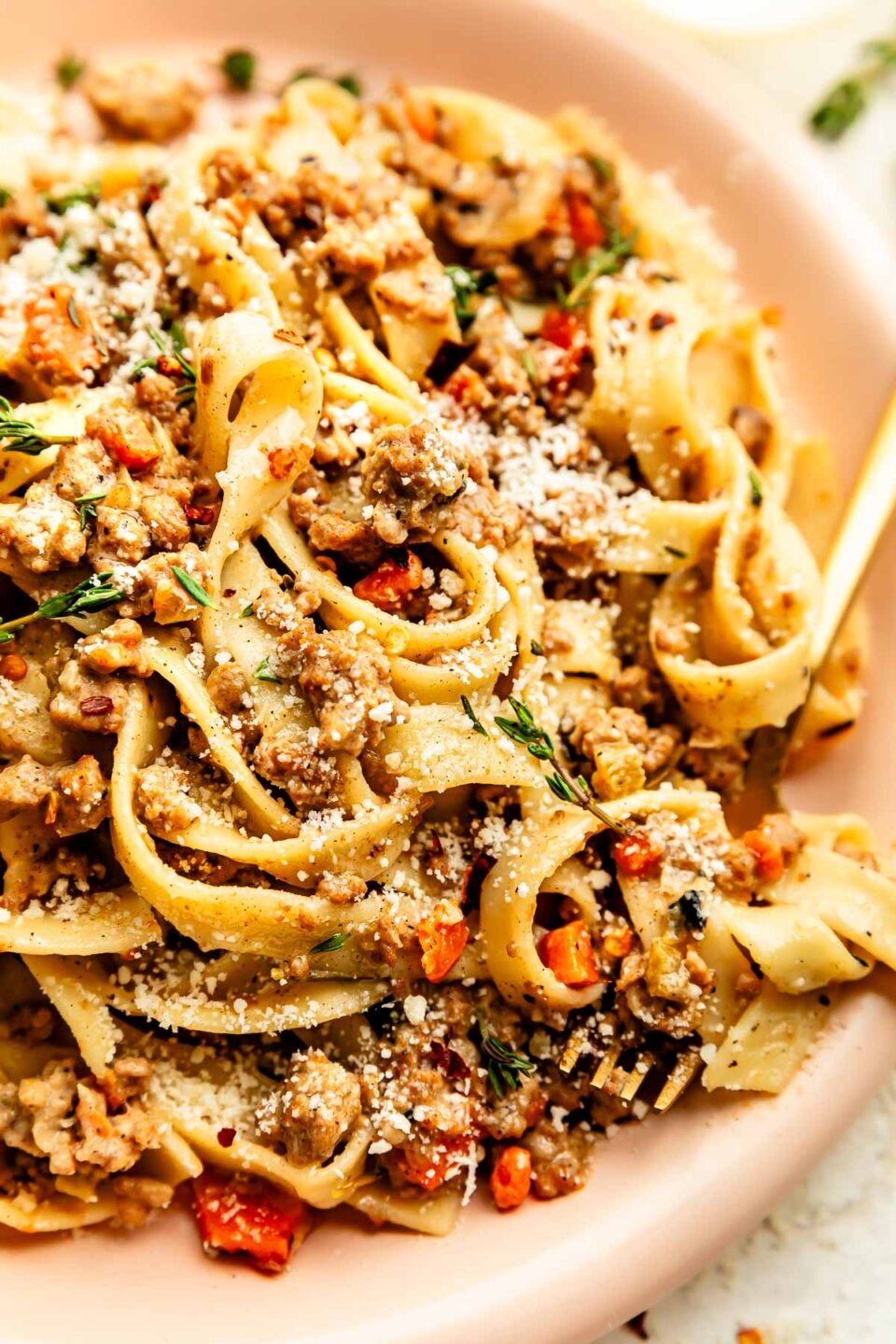
I can’t wait for you to try this Luscious White Bolognese with Tagliatelle! It has all the richness you love about classic red bolognese but with an even dreamier creamy texture – pure comfort!
If you do give it a try, be sure to let us know! Leave a comment with a star rating below. You can also snap a photo and tag @playswellwithbutter on Instagram. We LOVE seeing your PWWB creations! ♡ Happy cooking!
Print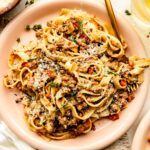
Luscious White Bolognese Sauce with Tagliatelle (Bolognese Bianco)
- Prep Time: 15 minutes
- Cook Time: 1 hour 45 minutes
- Total Time: 2 hours
- Yield: serves 6-8 1x
- Category: Pasta Recipes, Main Dishes
- Method: Stovetop
- Cuisine: Italian
Description
It may come as a surprise to learn that there are 2 versions of Italian ragu alla bolognese: the hearty, tomato-forward version familiar to most of us here in the U.S., and Bolognese Bianco, a tomato-free sauce made with milk or cream.
As a bolognese enthusiast, I’ve always wanted to try my hand at making this lesser known version, and this Luscious White Bolognese Sauce recipe is the result!
After several rounds of recipe testing, I became partial to starting with ground pork. Its lighter, sweeter flavor helps create a really balanced, luscious sauce. It simmers with pancetta, aromatic veggies & fresh herbs, and white wine until it’s super fragrant, then you finish it off with a generous splash of heavy cream.
The result is a rich and hearty meat sauce without tomatoes, and it practically begs to be tossed into a pile of al dente pasta. The perfect cozy meal for any winter night!
To learn more about white bolognese sauce, be sure to check out the blog post, above, and for alternate cooking methods, check out the Recipe Notes, below. ♡ Happy cooking!
Ingredients
- 4 ounces pancetta, roughly chopped (see Recipe Notes)
- 6 cloves garlic
- 1 ½ pounds ground pork
- 2 large carrots, diced
- 1 stalk celery, diced
- 1 large yellow onion, diced
- 1 cup dry, unoaked white wine, such as Pinot Grigio
- 3–4 sprigs fresh rosemary
- 10–12 sprigs fresh thyme
- 2 dried bay leaves
- optional: 1 parmesan rind
- up to 4 cups chicken stock
- ½ cup heavy cream
- ½ cup grated parmesan
- 24 ounces pasta of choice, such as tagliatelle, pappardelle, or rigatoni
- kosher salt and ground black pepper, to season
- for serving, as desired: grated parmesan, finely chopped fresh basil or parsley, crushed red pepper flakes, etc.
Instructions
- Prepare and render the pestata: Add the pancetta and garlic to the bowl of the food processor. Pulse to break the pestata mixture down into fine pieces – the garlic should disappear into the pancetta fat. Transfer the pestata to a large, heavy-bottomed pot (at least 4-quart capacity) over medium heat. Cook, stirring occasionally, until the pestata renders, about 4-5 minutes. The pancetta will be golden and garlic will be fragrant.
- Brown the pork: Season the ground pork generously with 1 ½ teaspoons kosher salt. Add the seasoned pork to the pot with the rendered pestata. Using a wooden spoon to break the ground pork apart into fine pieces, cook 4-5 minutes or until the pork is lightly browned. Transfer the browned pork and pestata to a plate and set aside. Use a spoon to drain all but 2-3 tablespoons of the rendered pork fat from the pot and discard. Return the pot to medium-high heat.
- Brown the soffritto. Add the diced carrots, celery, and onion to the pot. Season with 1 teaspoon kosher salt and stir to combine well. Cook, stirring occasionally, until the soffritto is deeply browned and fragrant, 15-20 minutes. If the vegetables begin to brown too quickly, reduce the heat to medium or medium-low.
- Deglaze the pot: Add the browned pork and pestata mixture from Step 2 back into the pot, stirring to combine with the soffritto. Slowly pour in the white wine, using a wooden spoon to scrape up any browned bits that may have formed on the bottom of the pan. Simmer until the wine is nearly cooked off, 4-5 minutes.
- Build the white bolognese sauce: Use kitchen twine to tie the fresh herbs together (or finely chop if you do not have twine). Add the herbs, bay leaves, and parmesan rind (if using) to the pot. Stir in the vegetable broth – I like starting with about 3 cups at first, then stirring more in as the white bolognese sauce simmers if needed.
- Simmer the white bolognese sauce. Bring the bolognese sauce to a boil, then reduce heat to maintain a gentle simmer. Partially cover the pot (place the lid on the pot such that it’s just partially covered, allowing some steam to escape as the sauce simmers). Simmer, stirring occasionally, for about 45 minutes. If the bolognese sauce begins to reduce too much, add in a splash of stock/broth and/or turn the heat down further.
- Finish the white bolognese sauce: Once the white bolognese sauce is simmered, remove the spent herbs, bay leaves, and parmesan rind from the pot and discard. Stir in the heavy cream and parmesan cheese. Simmer over low heat for 5-10 minutes longer, stirring occasionally.
- Boil the pasta: About 30 minutes before the bolognese sauce is ready, bring a large pot of salted water to a boil. Add the pasta and cook, stirring occasionally, until the pasta is cooked to al dente according to package directions. Carefully dip a liquid measuring cup into the pot, reserving about 1 cup of the starchy pasta water, and set aside. Carefully drain the pasta – do not rinse it! (Learn more! ⇢ How to Cook Pasta Perfectly Every Single Time!)
- White pasta bolognese assembly: Add the cooked pasta to the pot with the white bolognese sauce, tossing to coat. The sauce should evenly coat the pasta. Add in some of the reserved pasta water if the sauce needs to loosen up a little; add in an extra handful of parmesan if it needs to tighten up a little. Cook over medium heat for 1-2 minutes, allowing the pasta to meld with and absorb some of the white bolognese sauce.
- Serve: Portion the white pasta bolognese into individual pasta bowls, topping with additional grated parmesan, chopped fresh herbs, and/or crushed red pepper as desired. Serve immediately. Enjoy!
Notes
- Jess’ Tips and Tricks:
- Pancetta is cured, unsmoked Italian bacon. Widely available at most conventional grocery stores, you can typically find pancetta already diced up in an individual container near the cured meats and bacon, or cut-to-order at the deli counter. Feel free to swap it out with regular American-style bacon if that’s what you can find easily – thick, center-cut bacon works best for this recipe.
- Best pasta for white bolognese sauce: A general rule of thumb to keep in mind in choosing what pasta to pair with your sauce is the heartier the sauce, the wider the pasta. Rich, hearty sauces like ragu and bolognese are best paired with wider or heartier pasta. I prefer serving white bolognese with tagliatelle (pictured), which is a great mid-point between pappardelle and fettuccine. If you prefer short pasta, be sure to choose a shape that will capture bits & pieces of the hearty white bolognese sauce for even more delicious bites of pasta – rigatoni is my all-time favorite.
- 10-Minute Meal Prep: Nearly all of the active prep work for this white bolognese recipe comes from prepping the veggies. Take care of this in advance – it takes 10 minutes, tops! – & you can jump straight in to cooking during the week: Dice 2 medium carrots, 1 stalk of celery, & 1 medium yellow onion. Transfer to an airtight container & store in the refrigerator for up to 5 days. (10 minutes active)
- Make-Ahead, Storage and Freezing:
- White Pasta Bolognese Storage and Reheating: Once assembled, white pasta bolognese will keep, stored in an airtight container in the refrigerator, for up to 4 days. Reheat in the microwave or on the stovetop until warmed through, adding a splash of water/broth as needed to loosen the sauce.
- Make-Ahead White Bolognese Sauce Storage and Reheating: White bolognese sauce stores incredibly well – it’s the type of thing that gets even better as it sits and its flavors have the chance to meld together. To store, prep the sauce through Step 7 of Recipe Directions, above. Once cooled, transfer to an airtight container and store in the refrigerator for 4-5 days. Whip up a batch of white pasta bolognese during the week by reheating the white bolognese sauce in a skillet, and completing the recipe according to Steps 8-10, above.
- White Bolognese Sauce Freezing Instructions: White bolognese sauce is also incredibly freezer-friendly. To freeze, transfer the cooled white bolognese sauce to a freezer container (or divide it up between multiple freezer containers for smaller portions – Souper Cubes are my fave!). Freeze up to 3 months. To thaw, place the frozen white bolognese in the refrigerator overnight or submerge the freezer container in room temperature water for a quicker thaw. Reheat the white bolognese sauce in a skillet. If the thawed white bolognese sauce is a little watery at first, simply allow any residual water simmer out. If the thawed white bolognese sauce is too thick, simply add in a splash of water or stock until your desired consistency is reached. Complete the recipe according to Steps 8-10, above.
- Alternate Cooking Methods:
- Crock Pot / Slow Cooker White Bolognese Sauce: Prep the sauce according to Steps 1-4, above. Transfer the deglazed meat mixture to the slow cooker, along with the aromatics and broth/stock as directed in Step 5. Slow cook on high for 2-3 hours or on low for 4-6 hours, stirring occasionally. Finish the white bolognese sauce as directed in Step 7 and complete the recipe according Steps 8-10, which you can do right in your slow cooker. If your slow cooker has a searing/browning feature, you can use it to cook the entire white bolognese sauce recipe (Steps 1-7) in the slow cooker.
- Electric Pressure Cooker / Instant Pot White Bolognese Sauce: Use your Instant Pot’s “Sauté” setting to build the white bolognese sauce according to Steps 1-5, above. Cover and seal the pressure cooker and cook on manual high pressure for 35 minutes. Allow the pressure cooker to naturally release pressure for 10 minutes before carefully flicking the valve to its “venting” position to vent out any residual pressure. If the white bolognese sauce seems a little too liquidy, feel free to turn on the Sauté setting again, letting the sauce simmer down a little before finishing as directed in Step 7. Complete the recipe according to Steps 8-10, which you can do right in pressure cooker pot.
Recipe and Food Styling by Jess Larson, Plays Well With Butter | Photography by Rachel Cook, Half Acre House.
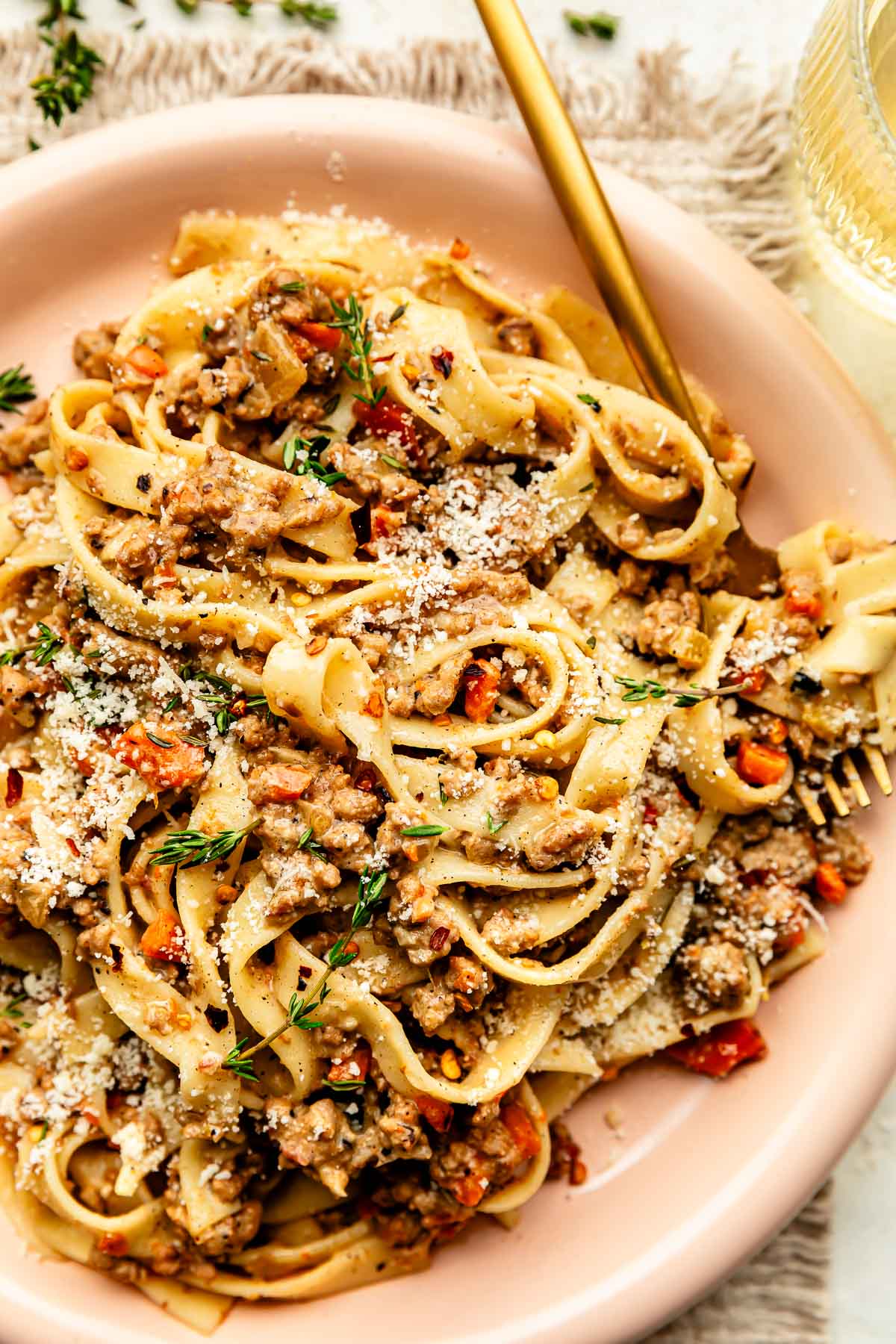
Follow along with Plays Well With Butter on Instagram, YouTube, Facebook, and Pinterest for more unfussy recipes that pack a big punch of flavor!


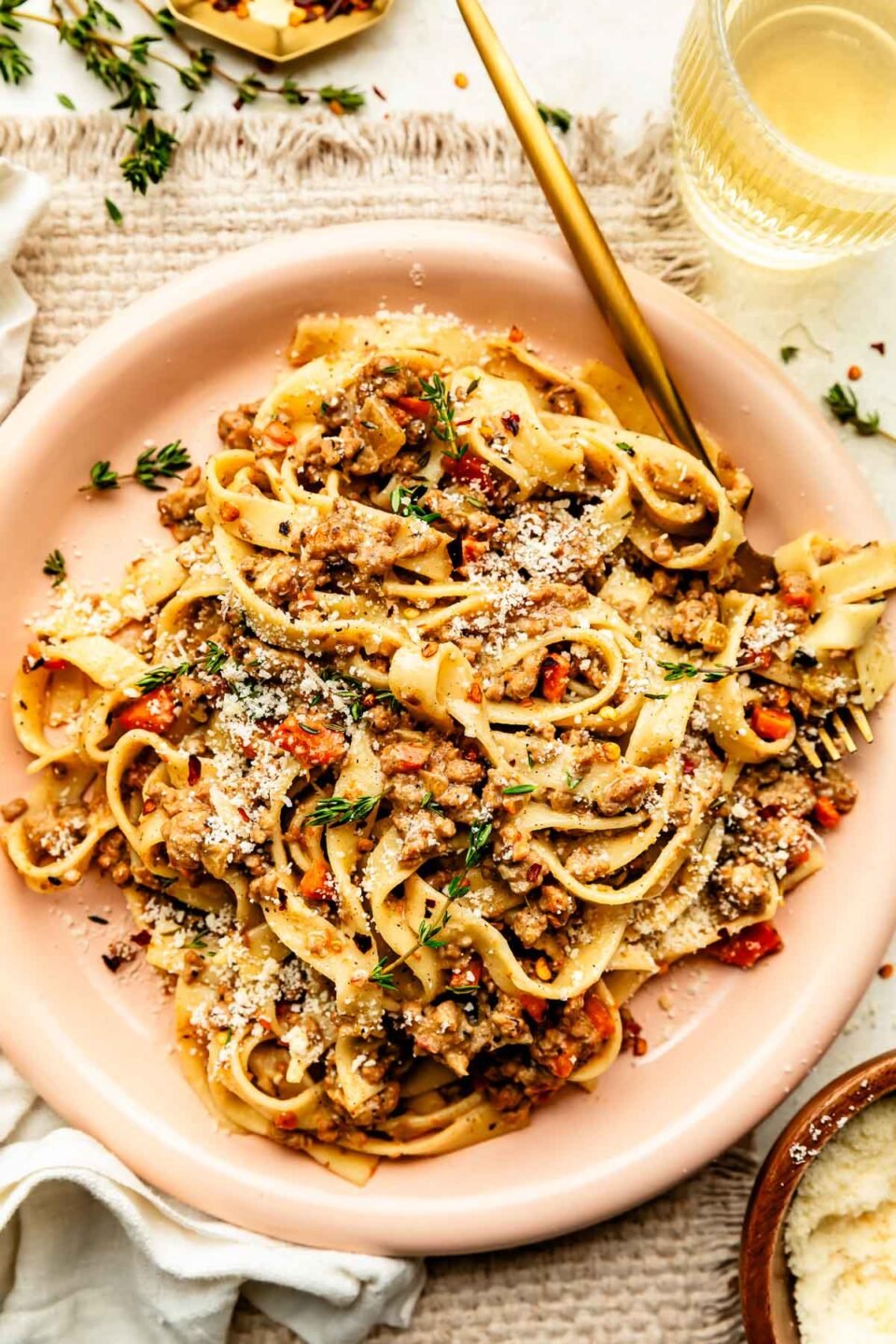
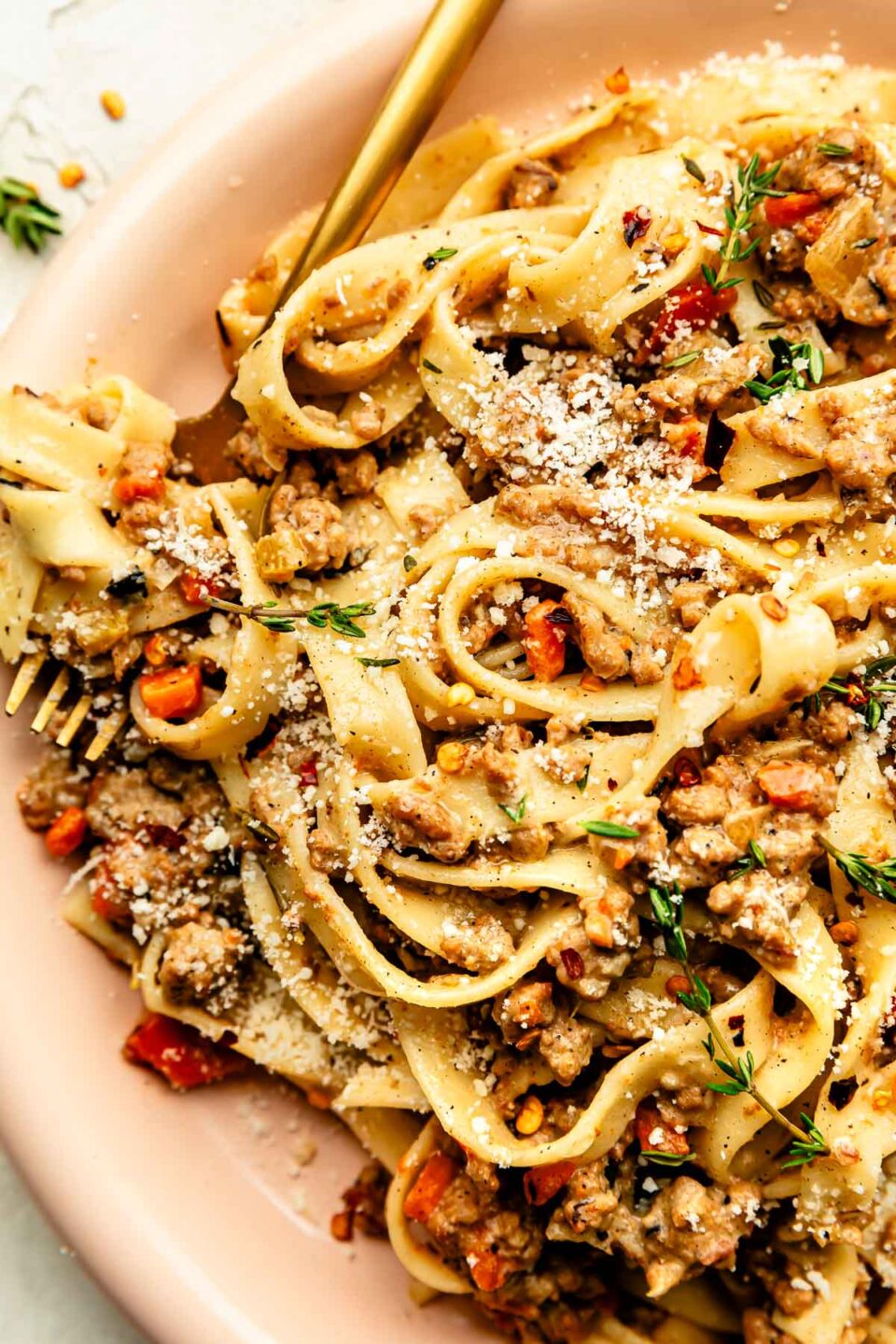
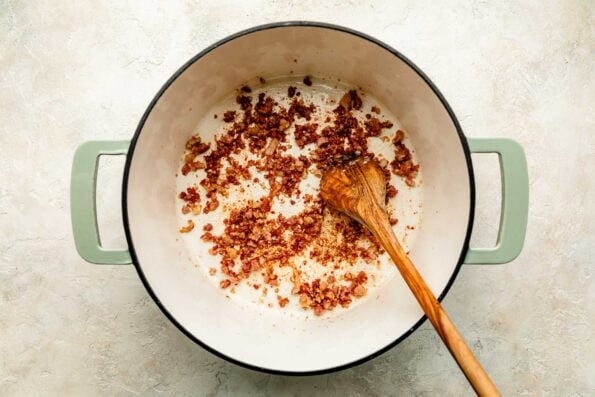
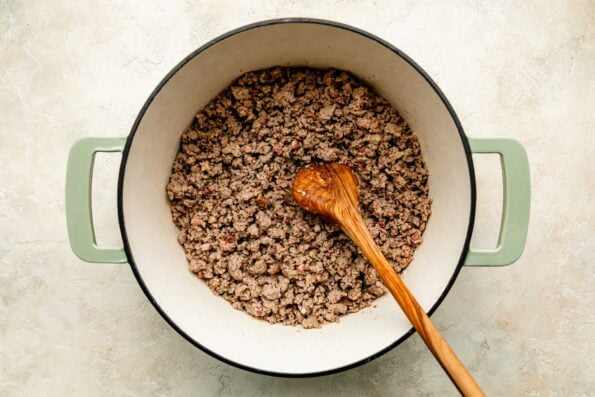
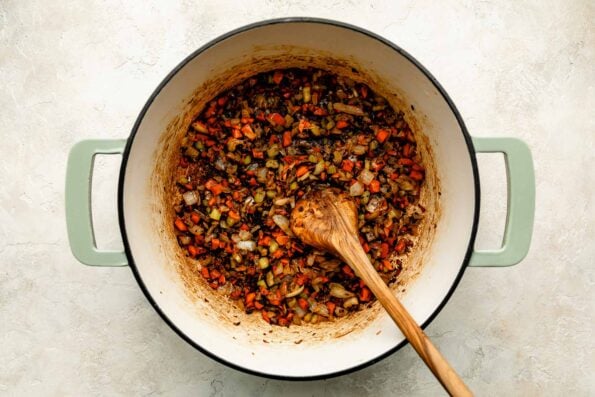
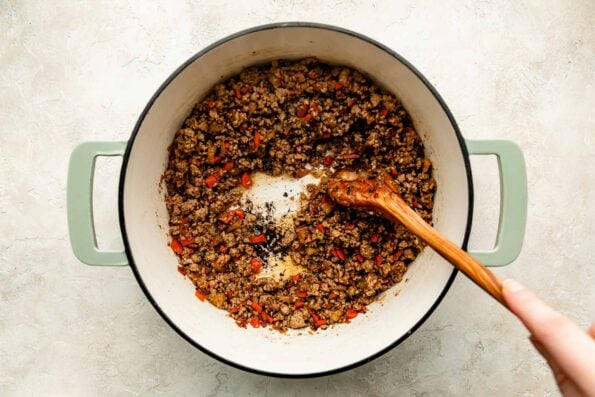
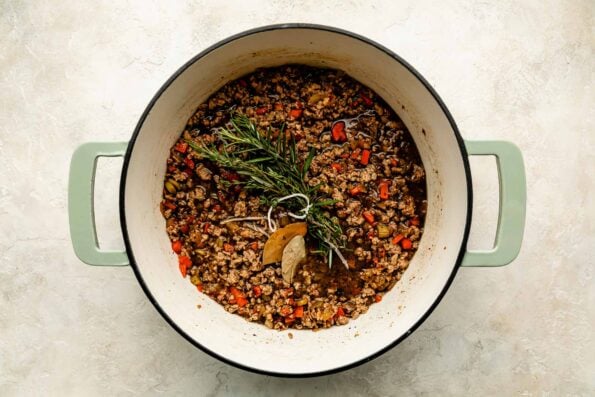
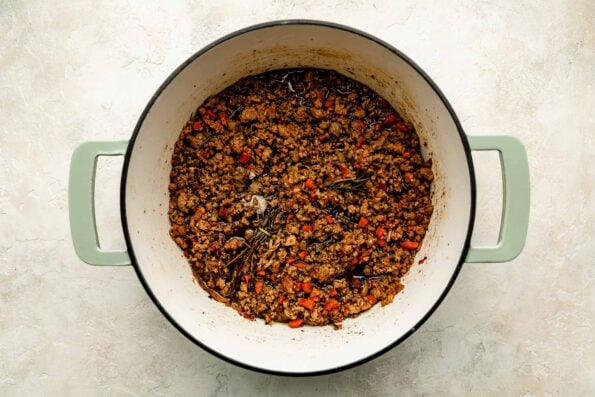
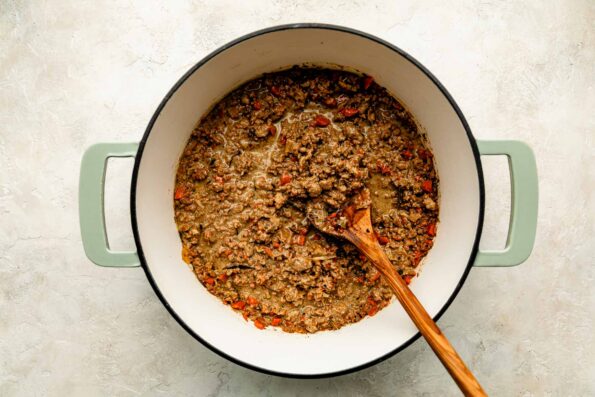
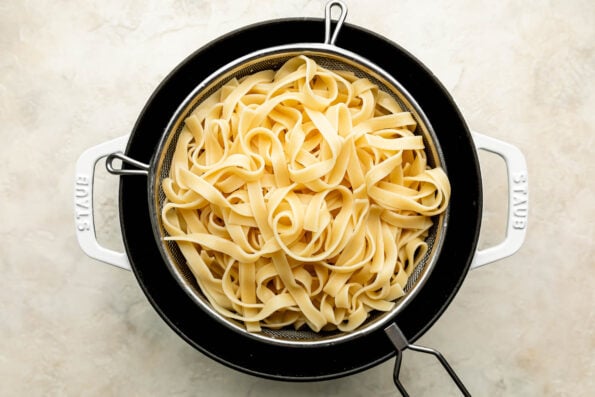
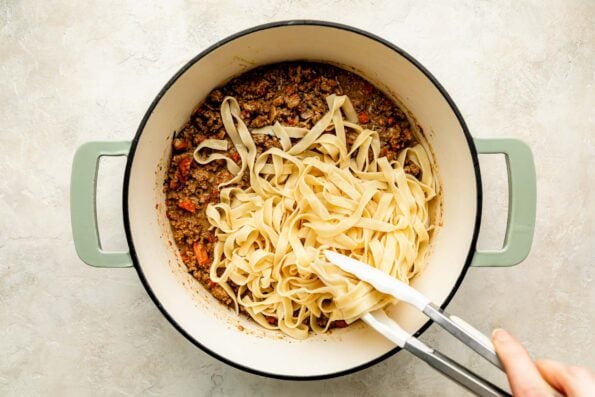
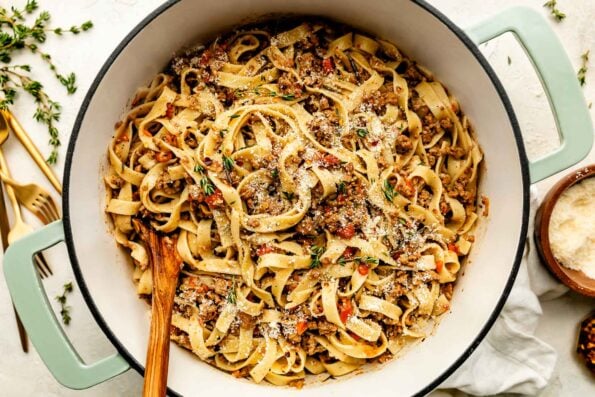

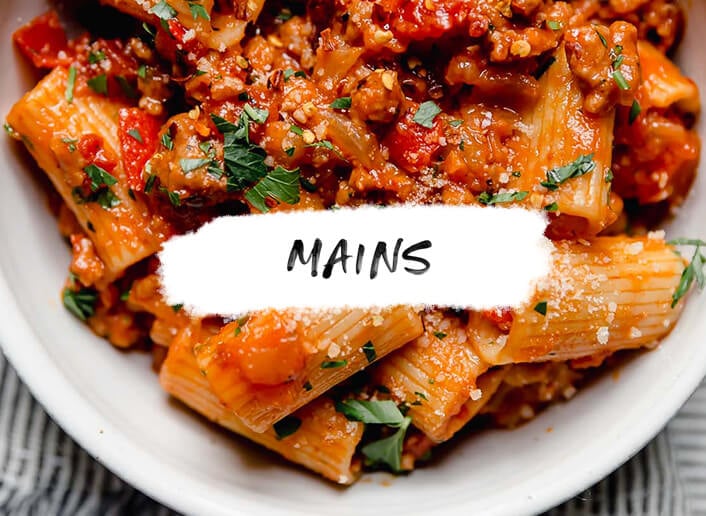
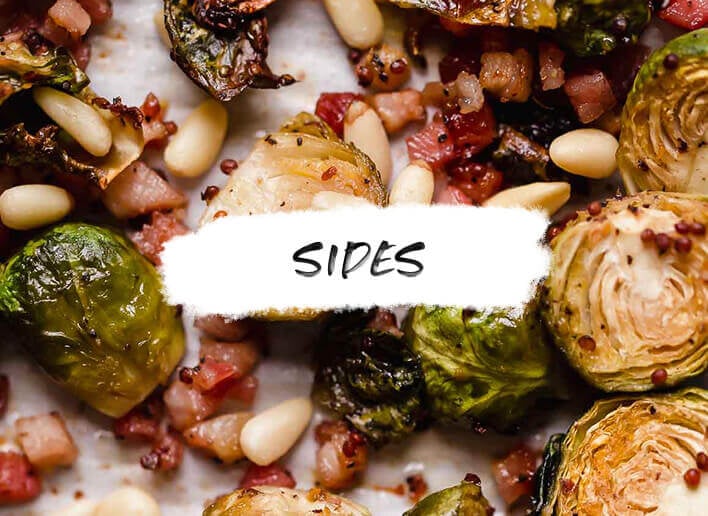


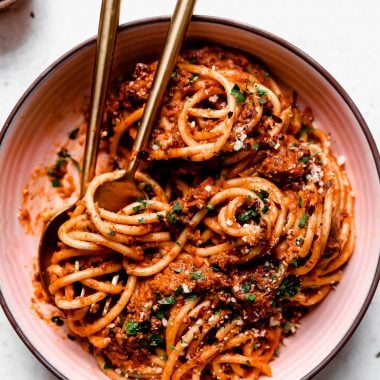
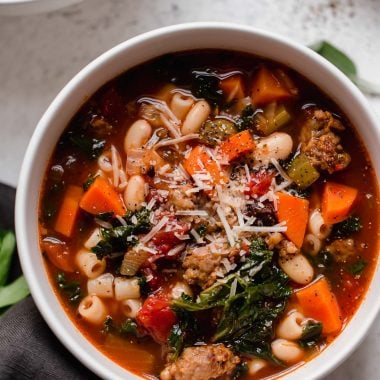
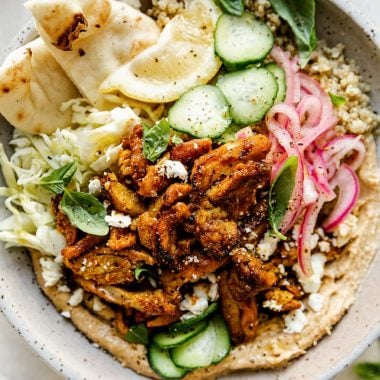
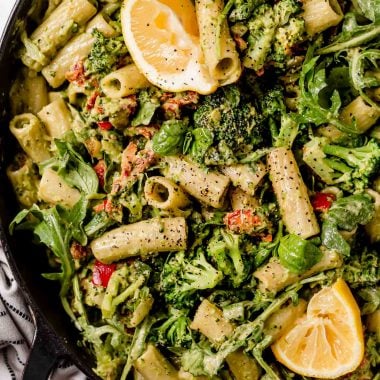


Did you revise this recipe? I made it 2 weeks ago and there are a lot of things that are way different. Same ingredients but totally different way of making it?
Hi Libby! No, this recipe hasn’t been updated or revised since we shared it in December. Can you tell me a little about the differences you remember and maybe I can help?
Jess